Twelve free verse poems chronicle the events and feelings of a Navajo girl’s eleventh year.
Stories in verse
Noni The Pony Counts To A Million
Noni the Pony counts everything from her two friends to the cars going by, all the way to a million stars in the night sky.
Singing With Elephants
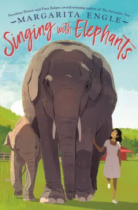
Lonely Cuban-born eleven-year-old Oriol lives in Santa Barbara, California, where she enjoys caring for injured animals, but her budding friendship with Gabriela Mistral, the first Latin American winner of a Nobel Prize in Literature, emboldens Oriol, an aspiring writer, to open up and create a world of words for herself.
Amber And Clay
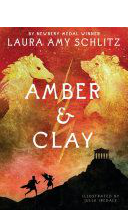
A Thracian slave in a Greek household, Rhaskos is as common as clay, a stable boy worth less than a donkey, much less a horse. Wrenched from his mother at a tender age, he nurtures in secret, aided by Socrates, his passions for art and philosophy. Melisto is a spoiled aristocrat, a girl as precious as amber but willful and wild. She’ll marry and be tamed—the curse of all highborn girls—but risk her life for a season first to serve Artemis, goddess of the hunt. Bound by destiny, Melisto and Rhaskos—Amber and Clay—never meet in the flesh. By the time they do, one of them is a ghost. But the thin line between life and death is just one boundary their unlikely friendship crosses. It takes an army of snarky gods and fearsome goddesses, slaves and masters, mothers and philosophers to help shape their story into a gorgeously distilled, symphonic tour de force.
Amber & Clay is featured in A Dozen Poetry Books.
Carry On-poetry by young immigrants
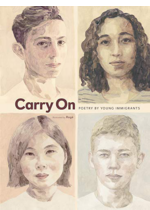
Carry On began in a high school in Outremont, Quebec, where author and poet Simon Boulerice conducted creative-writing workshops for young newcomers to Canada. As the students began writing, their poems gave voice to their reflections on leaving family, friends, and countries of origin to make new homes and connections in their new home, Canada.
Paired with expressive portraits by award-winning artist Rogé, each young writer reflects on the experience of leaving one home for another. The collection of poems express feelings of anxiety, sorrow, anticipation, gratitude, and hope for the future. With thoughtful verse and evocative illustrations, Carry On is a tribute to human resilience, the voices of newcomers, and creating empathy for all those who wonder about their place in the world.
Burying The Moon
In Latika’s village in rural India, there are no toilets. No toilets mean that the women have to wait until night to do their business in a field. There are scorpions and snakes in the field, and germs that make people sick. For the girls in the village, no toilets mean leaving school when they reach puberty.
No one in the village wants to talk about this shameful problem. But Latika has had enough. When a government representative visits their village, she sees her chance to make one of her dreams come true: the construction of public toilets, which would be safer for everybody in her village.
Burying the Moon shines a light on how a lack of access to sanitation facilities affects girls and women in many parts of the world.
Samira Surfs
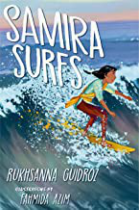
Samira thinks of her life as before and after: before the burning and violence in her village in Burma, when she and her best friend would play in the fields, and after, when her family was forced to flee. There’s before the uncertain journey to Bangladesh by river, and after, when the river swallowed her nana and nani whole. And now, months after rebuilding a life in Bangladesh with her mama, baba, and brother, there’s before Samira saw the Bengali surfer girls of Cox’s Bazar, and after, when she decides she’ll become one.
Aquí Era El Paraíso / Here Was Paradise: Selección De Poemas De Humberto Ak’abal / Selected Poems Of Humberto Ak’abal
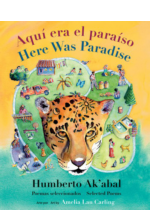
Aquí era el paraíso / Here Was Paradise is a selection of poems written by the great Maya poet Humberto Ak’abal. They evoke his childhood in and around the Maya K’iche’ village of Momostenango, Guatemala, and also describe his own role as a poet of the place.
Room For Everyone
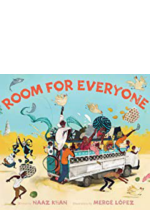
Musa and his sister travel to a Zanzibar beach in a shared minibus which, despite Musa’s protests, gets loaded with everything from a man and his bicycle to ten swimmers.
The Land Of The Cranes
Nine-year-old Betita and her parents fled Mexico after her uncle was killed by the cartels, and settled in Los Angeles seeking political asylum and safety in what her father calls Aztlan, the land of the cranes; but now they have been swept up by by the government’s Immigration Customs Enforcement, her father deported back to Mexico, and Betita and her mother confined in a family detention camp–Betita finds heart in her imagination and the picture poems her father taught her, but each day threatens to further tear her family apart.
